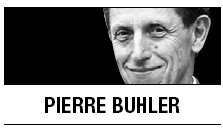PARIS ― The winner of Sunday’s legislative election in Russia was a foregone conclusion: United Russia, organized by Vladimir Putin. Likewise, there is no doubt that Putin himself will win the presidential election due in March 2012. But the public enthusiasm that ratified Putin’s rule for a decade has vanished, something demonstrated by the poor performance of his party, United Russia, in the just concluded elections to the Duma.

Unlike Europe, beset by a sovereign-debt crisis, and the United States, whose leaders are wrangling over how to stem the deficit, Russia may look like an oasis of stability and continuity. But that continuity is more reminiscent of the zastoi, or stagnation, of the Brezhnev era.
Eight years of 7 percent average annual GDP growth during Putin’s previous presidency (2000-2008) allowed Russia to repay its debts, accumulate almost $600 billion in foreign-currency reserves, and join the leading emerging economies. A decade after the 1998 crisis brought Russia to its knees, its leaders boasted that the country could weather the 2008 financial crisis.
Given Russia’s economic fundamentals, Putin’s diminished popularity might appear surprising. The International Monetary Fund’s forecast of 4 percent growth in 2011 and subsequent years puts Russia well behind China and India, but far ahead of average growth rates in the rich G7 countries. Moreover, Russia’s budget will be balanced as long as oil prices remain above $110 per barrel.
Longer-term trends have also improved. Rapid demographic decline has been brought to a halt since the turn of the century (a time when coffins outnumbered cribs by seven to four), as generous government subsidies for a third child have boosted the fertility rate from its 1999 low of 1.16 children per woman to 1.58 in 2010. That is still far below the replacement rate of 2.1, but higher fertility, together with successful measures to reduce male mortality, has slowed the pace of population shrinkage.
But Russia remains essentially a “rentier state” ― that is, a state whose primary source of revenue is rent ― in this case, oil and gas ― rather than taxation, which thus keeps demands for political representation at bay. Instead, the state is the target of political entrepreneurs who strive to capture it in order to capture the rents that it controls.
Russia has most of the usual features of rentier states: autocracy, weak political and judicial institutions, arbitrary governance, lack of the rule of law, little transparency, restraints on freedom of expression, widespread corruption, cronyism, and nepotism. Also common to rentier states are short investment horizons, vulnerability to commodity-price volatility ― euphoria when they surge, crisis when they collapse ― and an underdeveloped and uncompetitive manufacturing sector.
Today’s Russia is a gigantic reservoir of raw materials, and its economy relies heavily on commodities ― mining and drilling. Russia is the world’s largest oil and gas exporter, sitting on more than 25 percent of total proven gas reserves. Those commodities account for over two thirds of the country’s export earnings, and are the primary source of state revenue.
The impact on governance is all too predictable. In 2011, Transparency International’s “corruption perception” index ranked Russia 143rd out 182 countries, on a par with Nigeria, and 182nd out of 210 for “control of corruption,” one of the World Bank’s worldwide governance indicators. Regarding the rule of law, there has been only minimal improvement, with Russia ranked 156th.
In the meantime, infrastructure is crumbling even within the vital extractive industry, while manufacturing is internationally uncompetitive. The Russian armaments industry has lost its strong position with India and China, once its two main customers. Despite the hype about nanotechnology and a “Russian Silicon Valley” at Skolkovo, spending on R&D is a mere one-fifteenth of the U.S. level, and one-quarter of China’s. As a proportion of GDP, it has been halved since the early 1990s, and is now just 1 percent of GDP. Scientists and researchers, once the pride of the Soviet Union, have vanished, often lured by more rewarding opportunities, at home or abroad.
Indeed, Russian universities are almost absent from global rankings: only two appear in the Shanghai University Top-500 list and, at the very bottom, among the 400 rated by The Times Higher Education Supplement. Russia also fares poorly ― 63rd ― in the Global Competitiveness Index released by the World Economic Forum, well behind all developed countries and even many developing countries. The same holds for innovation capacity and technology.
Yet there are hints of hope. Russia no longer lags behind the developed world in Internet use, which has provided space for unregulated speech, allowing users to circumvent the official ― and overwhelmingly pro-Putin ― news media. Moreover, after lengthy negotiations, Russia recently reached an agreement with the World Trade Organization to join, implying the need to comply with all relevant obligations regarding transparency and trading rules.
But comprehensive transformation of Russia’s economy remains doubtful. One of Russia’s leading independent economists, Sergei Guriev, the rector of the New Economic School in Moscow, soberly noted in 2010 that
“meaningful reforms look highly unlikely ― for the simple reason that they would harm the interests of Russia’s ruling elites. In any resource-rich and undemocratic country, the political class and the business interests that surround it have little or no incentive to support stronger property rights, the rule of law, and competition. Indeed, such structural changes would weaken the elite’s grip on political and economic power. The status quo ― opaque rules, arbitrary decision-making, and lack of accountability ― allows insiders to enrich themselves, especially by obtaining a share of commodity-export revenues.”
When Russia marks the twentieth anniversary of the collapse of the Soviet Union this Christmas, it will have much to celebrate. Unfortunately, what hasn’t changed will give it much to rue.
By Pierre Buhler
Pierre Buhler, a French diplomat, is the author of “La Puissance au XXIme sicle (Power in the Twenty-First Century).” ― Ed.
(Project Syndicate)








![[Weekender] Korea's traditional sauce culture gains global recognition](http://res.heraldm.com/phpwas/restmb_idxmake.php?idx=644&simg=/content/image/2024/11/21/20241121050153_0.jpg)